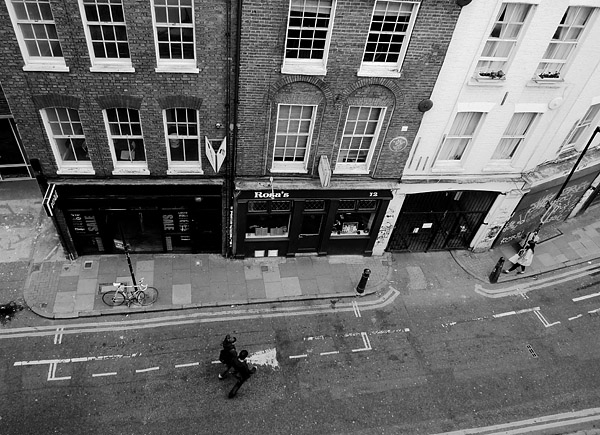Taylor Davidson · Zombie travel is travel without conscious thought.

A nice, but misguided, attempt to connect the principles behind Umair Haque’s Zombieconomy to our choices of how to travel, followed by a bit of a rant.
Lonely Planet, Zombie Travel:
For what shall it profit travellers, if they visit the whole world without experiencing it fully?
The Lonely Planet community has always been about Independent Travel. Our success is being able to empower curious people to get to the heart of a place, whether by getting around on public transport, getting beyond the tourist traps, supporting local businesses, or relating to the wonderful and the everyday in every destination. But a lot of travellers are unaware of the benefits of Independent Travel, and instead support Zombie Travel.
What is Zombie Travel?
It’s a part of the larger Zombieconomy. Harvard Business Review [actually, Umair Haque) describes the Zombieconomy as being ‘built on McMansions, Hummers, and $5 lattes’. In other words, it is the products and lifestyles that don’t add value to our lives. In fact, they take away value. They destroy our standard of living, the environment, and minority cultures, and distract us from adding real value to our lives.
Yes, but I have a quibble coming…
So Zombie Travel is the vacation spent all day, every day on the beach getting skin cancer, instead of learning even a little about the local culture and history; it is drinking at Irish pubs in France instead of finding a family run brasserie or cafe; it is staying only at cloned five-star international hotel chains, instead of trying a locally owned guesthouse; it is going on an air-conditioned coach tour of a city, rather than creating your own walking tour.
In short, Zombie Travel is typically luxury without value.
Yes, but no.
Zombie travel is travel without conscious thought.
The mistake: a misguided interpretation of Haque’s thoughts. The Zombieconomy is not created by the products themselves but the resource allocation processes that leads to short-sighted, misplaced production and consumption decisions based on perceived, “thin”, short-term value, neglecting real, “thick”, long-term value.
If someone truly values getting a suntan all day, or lounging in a Starbucks in Beijing, or eating at 7-11 in Japan, and makes those choices consciously, because they truly enjoy those experiences, than who are we to judge?
People are entitled to the right to experience a place and a destination in their own way, for their own reasons, safe from judgment. All travelers are created equal.
“McMansions, Hummers, and $5 lattes” are example of poor decisions, but they are not the root cause of the problem; the problem is how business and society accounts for and values the costs and benefits of our actions. Systems that take a limited, non-holistic view of costs and benefits create economic incentives that misallocate resources, attention, and actions, creating unending patterns of destructive behavior.
In short, “luxuries without value” aren’t an issue if people make conscious decisions based on a holistic accounting of their true value.
Focusing on “McMansions, Hummers, and $5 lattes” might be an easier way to communicate the idea, but it is still misleading; neglecting to focus on the root processes and causes of our mistakes dooms us to repeat our mistakes in new ways.
I tend to avoid Irish pubs in France, five-star hotels and air-conditioned coach tours, but for my own, personal, conscious reasons. In the end, the fruits of your life are the only validation you need.
—
Updated 7.24.2009
A friend justifiably asked me today to explain myself better on one point:
“McMansions, Hummers, and $5 lattes” are example of poor decisions, but they are not the root cause of the problem; the problem is how business and society accounts for and values the costs and benefits of our actions.
Many of our decisions behind what we produce (companies) and consume (people) impact people not directly involved in the transaction, creating positive and negative externalities.
Systems that take a limited, non-holistic view of costs and benefits create economic incentives that misallocate resources, attention, and actions, creating unending patterns of destructive behavior.
Since prices do not reflect the full costs or benefits in production or consumption, either too little or too much of a good is produced and consumed in relation to the full benefit and cost to society. In essence, society bears some of the costs (or accrues some of the benefits) to individuals’ decisions. More holistic methods of accounting gives more complete information for people to evaluate what they consume, pay attention to (e.g. choice of media), and what they spend their time producing (e.g. jobs, careers).
How does behavior change? What will help or make us change our decisions?
- Account for the full costs and benefits of our actions,
- Structure that information for individuals, groups and society,
- Create systems that enable us to (and force us to) use that information as we weigh our decisions.
Systems shape our behavior by creating economic inventives for particular actions: for example, tax policy in the USA is a primary example of how the government subsidizes and taxes certain behaviors in an attempt to influence the decisions we make.
While our decisions about what we buy and produce change constantly, the incentives that frame those decisions are far less malleable; the fact that our decisions change does not guarantee that we’re actually any better. Without understanding the incentives shaping our behavior we are doomed to repeat the mistakes of our past.